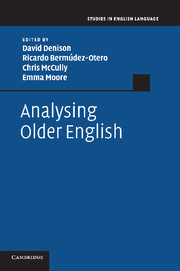Book contents
- Frontmatter
- Contents
- Figures and maps
- Tables
- Contributors
- General introduction
- Part I Metrics and onomastics in older English
- Part II Writing practices in older English
- 5 Introduction to Part II
- 6 Anglian features in late West Saxon prose
- 7 ‘ea’ in early Middle English
- Part III Dialects in older English
- Part IV Sound change in older English
- Part V Syntax in older English
- References
- Index
6 - Anglian features in late West Saxon prose
Published online by Cambridge University Press: 05 December 2011
- Frontmatter
- Contents
- Figures and maps
- Tables
- Contributors
- General introduction
- Part I Metrics and onomastics in older English
- Part II Writing practices in older English
- 5 Introduction to Part II
- 6 Anglian features in late West Saxon prose
- 7 ‘ea’ in early Middle English
- Part III Dialects in older English
- Part IV Sound change in older English
- Part V Syntax in older English
- References
- Index
Summary
It has long been known that some of the linguistic features of the Anglian dialects are commonly found also in a sizeable number of prose texts whose dialect is chiefly late West Saxon, but whose origins are unknown – a group of texts which, for present purposes, may be referred to as ‘unplaced’ texts. These features are missing, however, from those texts, mostly of known authorship, that are considered the best witnesses to the West Saxon dialect, both early and late. Admittedly, there is a degree of circularity to the reasoning involved in making these identifications: certain texts are regarded as evincing mixed dialect because their divergent features are absent from texts whose relative purity of West Saxon dialect is defined in large part by the absence of such features. But the circular logic of this is not quite as closed as it may at first appear, since nearly all the pure West Saxon texts come from identified authors and in manuscripts not far removed in time from their date of composition. That is, there are non-linguistic grounds for regarding these texts as West Saxon.
Bülbring (1902) explained mixed dialect features in prose as part of a patois of a local character in West Saxon and in the other Saxon dialects, and even as recently as 1965 it was argued that some distinctively Mercian features were current in parts of Wessex (Sprockel 1965: xxvi n. 2). Of course, the wealth of work that has been done on regional dialectology since then allows us now to see that a uniform dialect across all of Wessex is unlikely: isoglosses do not bundle so neatly. Still, the assumption that all these features are attributable to the copying of texts in different parts of Wessex and the other Saxon kingdoms is by no means inevitable. In the tenth and eleventh centuries, West Saxon was the standard literary dialect, used in all parts of England, a situation rife with opportunities for dialect mixture in the preserved manuscripts. And naturally a scribe might reside in a religious house outside his own dialect area and thereby acquire mixed dialect forms in his own writing habits.
Information
- Type
- Chapter
- Information
- Analysing Older English , pp. 63 - 74Publisher: Cambridge University PressPrint publication year: 2011
Accessibility standard: Unknown
- 3
- Cited by
